#trotsky
Text
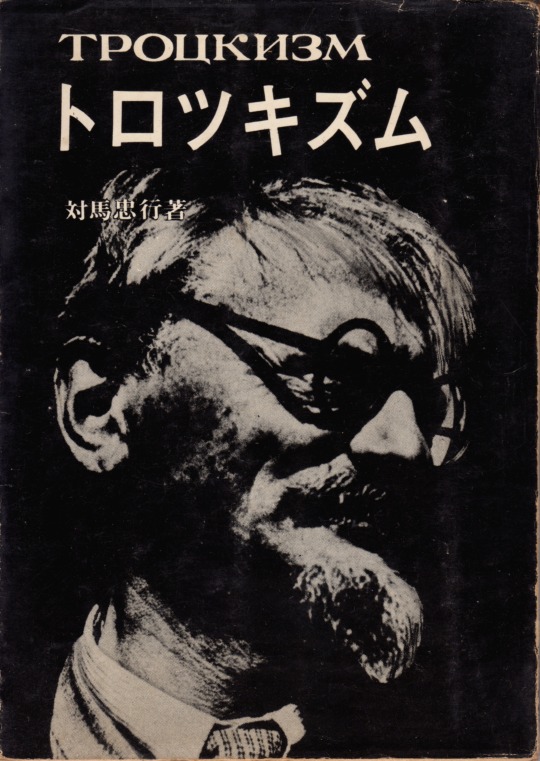
トロツキズム 対馬忠行
風媒社
#トロツキズム#Trotskyism#tadayuki tsushima#対馬忠行#leon trotsky#Trotsky#トロツキー#レフ・トロツキー#anamon#古本屋あなもん#あなもん#book cover
37 notes
·
View notes
Text
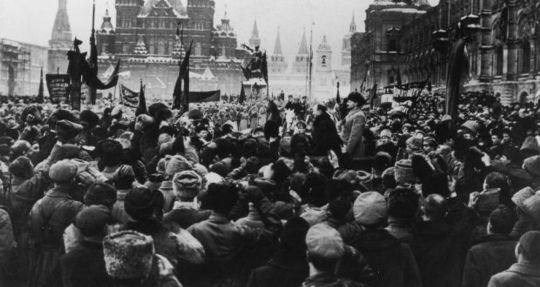
#I don't often come across pictures I've never seen before!#leon trotsky#trotsky#lenin#vladimir lenin#russian revolution
19 notes
·
View notes
Text
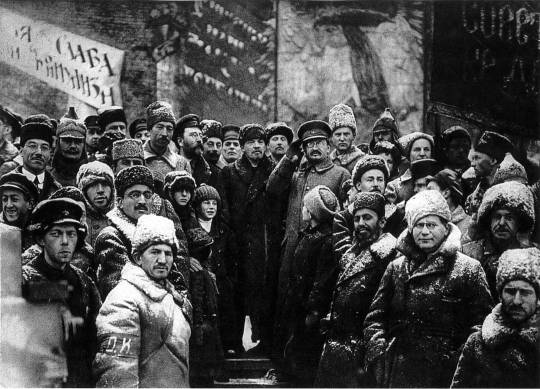
The consciousness of the workers of the whole world cannot grasp this fact; for the enemy is still very strong, the way is long, and the great work, the greatest of history, is unfinished; for the working class of the world needed Lenin as perhaps no one in the history of the world has yet been needed.
How shall we advance, shall we find the way, shall we not go astray? For Lenin, comrades, is no longer with us!
Lenin is no more, but Leninism endures. The immortal in Lenin, his doctrine, his work, his method, his example, lives in us, lives in the party that he founded, lives in the first workers' state whose head he was and which he guided.
May the pain we feel, that stabs our harts each time we think that Lenin is no more, be for each of us an admonition, a warning, an appeal: Your responsibility is increased. Be worthy of the leader who trained you!
L.D. Trotsky, Tiflis Station, January 22nd, 1924
"Lenin dead"
https://www.marxists.org/archive/trotsky/1925/lenin/13.htm
36 notes
·
View notes
Text
We should, however, keep three precepts in mind: 1. Trust not the bourgeoisie. 2. Control our own leaders. 3. Have confidence in our own revolutionary strength.
Trotsky: Towards October 1879-1917
32 notes
·
View notes
Text

Tankies hypocrisy
#trotskyism#tankies hypocrisy#tankies#tankie#no tankies#fuck off tankies#trotsky#kronstadt rebellion#kronstadt#history#class war#fascism#capitalism#statism#authoritarianism#antiauthoritarian#ausgov#politas#auspol#tasgov#taspol#australia#fuck neoliberals#neoliberal capitalism#anthony albanese#albanese government#funny memes#dank memes#best memes#relatable memes
10 notes
·
View notes
Photo

Since Trotsky came to Mexico I have understood his error. I was never a Trotskyist.
- Frida Kahlo
In the summer of 1940, Frida Kahlo found herself in jail. Mexico City police suspected her as an accomplice in the murder of the embattled Russian revolutionary Leon Trotsky. Several days prior to her arrest, he’d been gruesomely offed with an ice pick. His murder - and her implication in the crime - was a dramatic turn of events, especially considering that Kahlo and Trotsky had been giddy lovers just three years earlier; she’d even dedicated a striking self-portrait to him.
Kahlo had many romantic partners over the course of her short life (she died in 1954 at 47), but few resulted in dedicated paintings—and fewer pointed explicitly to her political beliefs. The liaison with Trotsky did both. Although their romance only lasted several months, it offers a window into Kahlo’s politics and how deeply they influenced her work.
Kahlo and Trotsky first met in 1937, when the painter was 29 and the politician was 57. Kahlo and her husband, muralist Diego Rivera, were vocal supporters of Marxism and had been on-and-off members of the Mexican Communist Party for a decade, since 1927. Influenced by the Mexican Revolution at the turn of the century, they advocated for a populist government and believed political power should rest in the hands of the working class.
By the mid-1930s, Kahlo and Rivera both considered themselves Trotskyites. They’d followed the Russian Revolution and the rise of Communism closely, and knew Trotsky as a hero of the 1917 October Uprising, which cemented Vladimir Lenin and the Socialist regime’s rise to dominance. But when Joseph Stalin assumed leadership in 1924, he consolidated power and demoted Trotsky, exiling him for good in 1929. As a result, the Communist party fractured into two main camps: Stalinists and Trotskyites.
It was Rivera who convinced Mexican President Lázaro Cárdenas to offer Trotsky political asylum in Mexico. After several years in Turkey, France, and Norway, Trotsky and his wife Natalia Sedova boarded an oil tanker and docked in Tampico, Mexico on January 9, 1937. Rivera was sick, so Kahlo greeted them at the port, along with a troop of armed guards.
Kahlo and Rivera offered the Trotskys their second home, the now famed Casa Azul, equipping it with guards, barricades, covered windows, and alarm systems to ensure their political hero’s safety. Sedova recalled the beginnings of the trip fondly in a letter to friends: “We were breathing purified air…A motorcar…carried us across the fields of palms and cacti to the suburbs of Mexico City; a blue house, a patio filled with plants, airy rooms, collections of Pre-Columbian art, paintings from all over: we were on a new planet, in Rivera’s house.”
It wasn’t long after the Russian couple settled in that a romance developed between Kahlo and Trotsky. The politician’s secretary, Jean van Heijenoort, remembered the pair’s blatant flirtations under the nose of Trotsky’s wife. Sedova didn’t understand English, the language in which the lovers communicated. They met clandestinely at Kahlo’s sister’s house, and Trotsky slipped love notes into books he lent her. Kahlo and Trotsky’s meek attempts at discretion didn’t prevent Sedova from discovering the affair. She gave her husband a “me-or-her ultimatum. It seems that Kahlo tired of the romance around the same time. Despite their split, the two remained friends for some time until Trotsky’s murder.
Photo: Russian revolutionary Leon Trotsky (right), Mexican artist Frida Kahlo (centre), and revolutionary and wife of Trotsky Natalia Sedova, photographed Together In Mexico In 1937.
#leon trotsky#trotsky#frida kahlo#kahlo#art#artist#marxist#communism#comunnist#mexico#russia#revolutionary#relationship#diego rivera#history#stalin#russian revolution#bolshevik#arts#society#politics
165 notes
·
View notes
Text
February 2024 Sketch Cards
More sketch cards, and now we are entirely caught up! I hope you enjoyed the Floating Gallery, and are getting a kick out of all these silly sketches. Up next is my #100Cats project, aka what I did with myself last spring!
I want to say I’m feeling messier than usual but let’s be real, these are pretty average. But hey, they’re on time!
Amber asked for Sportsball and I did this motley thing…
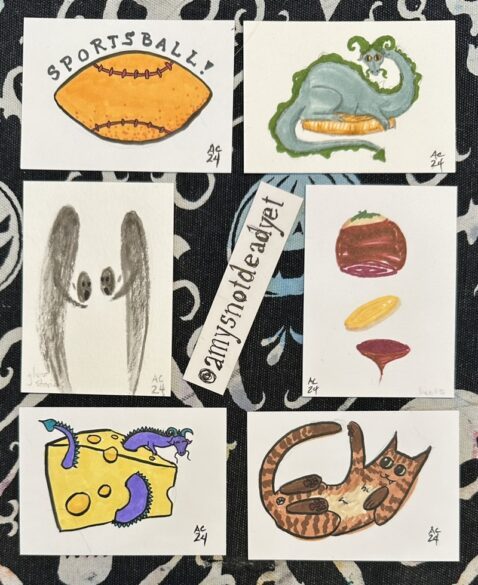
View On WordPress
7 notes
·
View notes
Text

Spambots are good actually.
19 notes
·
View notes
Text
By virtue of his name and profession, Ice Pick Joe is a callback to the assassination of Soviet Bolshevik revolutionary Leon Trotsky. When Josef Stalin took power after Lenin’s death, Trotsky fell from grace – and boy did he fall hard. Exiled from the very nation he helped found, Trotsky ended up in Mexico, where he was murdered on Stalin’s orders in 1940 by an assassin wielding an ice pick.
Analyzing Goncharov (1973) through the lens of the Russian Revolution, we can see how Ice Pick Joe represents dashed idealism and the irony of fate. Here is a man who dares challenge the very system that produced him, a man who strives to break the cycle of violence that surrounded him since his birth. His only tool is that of destruction, an ice pick in his hand with which he tries to shape the world.
However, if all you have is an ice pick, everything looks like a skull. The world he created for himself ultimately turns on him, casting him out. Exiled from society and written off as a criminal, Ice Pick Joe knows he can only find true freedom elsewhere. And yet – his attempt to escape on the boat and forge a new existence ends only in tragedy. He is cut down with his own tool, cursed to die by the very ice pick he once used to carve out his place in the world.
Metaphorically, Ice Pick Joe is both Trotsky and Trotsky’s assassin. He is the engineer of a revolution that devours him in the end. In reshaping the world, he reshapes himself...and in reshaping himself, he reshapes the destiny of every character in Goncharov.
58 notes
·
View notes
Text

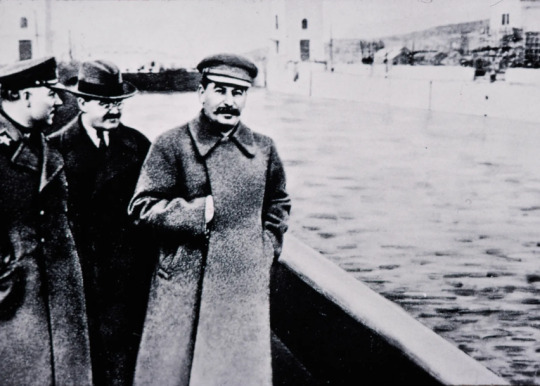
Ok so hear me out.
13 notes
·
View notes
Note
whats your opinion on trotskyism and leon trotsky himself?
of all the leninist-derived leftist ideologies, trotskyism is probably the one I find most ideologically sound. I've connected with trotskyists in the past and will continue to work with them in order to promote shared goals. I wouldn't call myself a trotskyist by any means, but I think trotsky did have some good things to say, (hidden within the endless bitching that often characterized his writing) specifically about fascism and its connection to the decay of capitalism. I'm of the opinion that even if one doesn't fully agree with the specific ideologies and actions of a prominent leftist figure, one can still appreciate contributions they've made to the theory and practice of revolutionary action.
I like trotsky's political stances somewhat more than lenin's and definitely more than stalin's. however from what I've read about and by him he was kind of petty in a way I find annoying. like he can make his point about how to combat fascism without throwing in a bunch of extra filler complaining about every single other leftist group and organization in existence. he definitely got scapegoated during the stalin and post-stalin eras of the ussr, which imo had more to do with it being a convenient political move than any specific thing that trotsky did or didn't do. still won't forgive him for kronstadt though. like I get why he did what he did but I don't agree with his reasoning for doing it nor the methods he used.
other than that I feel like trotsky's ideological positions function better as a rebuttal/critique of the stalin/post-stalin ussr than as an independent program. but that's just my opinion on the matter from what I've studied.
overall my feelings on trotsky/trotskyism are complicated. most of the ideas he lays out I feel neutral-to-positive about but he did do and say some things that I strongly disagree with and cannot ignore.
#pigeon.txt#sorry this took so long I've been rlly busy#and I didn't want to give a half assed response#magdalenepie#communism#leftism#trotsky
9 notes
·
View notes
Text
Hey I just want to be clear about something.
These are icepicks:

They're used for chipping ice
These are iceaxes:

They're used for mountain climbing.
The assassin Mercader struck Trotsky with a modified iceaxe he had hid in his coat.
Trotsky did not die immediately from his injury however, but turned around and fought his attacker until his security came in and took hold of Mercader.
Trotsky hung on until the next day, when he died in hospital with his wife and grandson by his side.
38 years later Mercader himself died, and his fearful last words were about Trotsky, "I know he's waiting for me on the other side."
#Trotsky#Leon Trotsky#icepick joe#goncharov#just want to clear this up since a lot of people are making connections between Trotsky and Icepick Joe#I'm not saying don't do that#I just want everyone to be clear that the way Trotsky went out was metal
214 notes
·
View notes
Text
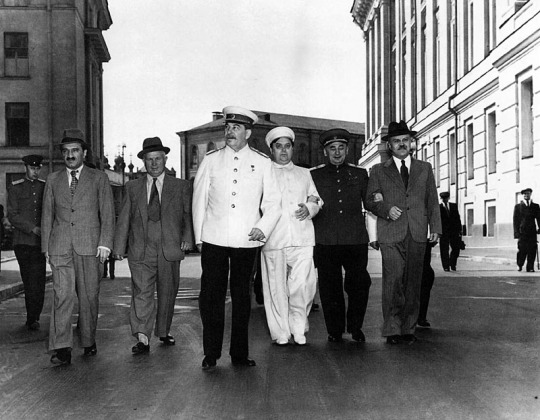
L-R: Mikoyan, Khrushchev, Stalin, Malenkov, Beria, and Molotov
“While such functionaries have much in common with Communist bureaucrats, especially as regards "esprit de corps," they are not identical. Although state and other bureaucrats in non-Communist systems form a special stratum, they do not exercise authority as the Communists do. Bureaucrats in a non-Communist state have political masters, usually elected, or owners over them, while Communists have neither masters nor owners over them. The bureaucrats in a non-Communist state are officials in modern capitalist economy, while the Communists are something different and new: a new class.
As in other owning classes, the proof that it is a special class lies in its ownership and its special relations to other classes. In the same way, the class to which a member belongs is indicated by the material and other privileges which ownership brings to him.
As defined by Roman law, property constitutes the use, enjoyment, and disposition of material goods. The Communist political bureaucracy uses, enjoys, and disposes of nationalized property.
If we assume that membership in this bureaucracy or new owning class is predicated on the use of privileges inherent in ownership - in this instance nationalized material goods - then membership in the new party class, or political bureaucracy, is reflected in a larger income in material goods and privileges than society should normally grant for such functions. In practice, the ownership privilege of the new class manifests itself as an exclusive right, as a party monopoly, for the political bureaucracy to distribute the national income, to set wages, direct economic development, and dispose of nationalized and other property. This is the way it appears to the ordinary man who considers the Communist functionary as being very rich and as a man who does not have to work.
The ownership of private property has, for many reasons, proved to be unfavorable for the establishment of the new class's authority. Besides, the destruction of private ownership was necessary for the economic transformation of nations. The new class obtains its power, privileges, ideology, and its customs from one specific form of ownership - collective ownership - which the class administers and distributes in the name of the nation and society.
The new class maintains that ownership derives from a designated social relationship. This is the relationship between the monopolists of administration, who constitute a narrow and closed stratum, and the mass of producers (farmers, workers, and intelligentsia) who have no rights. However, this relationship is not valid since the Communist bureaucracy enjoys a monopoly over the distribution of material goods.
Every fundamental change in the social relationship between those who monopolize administration and those who work is inevitably reflected in the ownership relationship. Social and political relations and ownership - the totalitarianism of the government and the monopoly of authority - are being more fully brought into accord in Communism than in any other single system.
To divest Communists of their ownership rights would be to abolish them as a class. To compel them to relinquish their other social powers, so that workers may participate in sharing the profits of their work - which capitalists have had to permit as a result of strikes and parliamentary action - would mean that Communists were being deprived of their monopoly over property, ideology, and government. This would be the beginning of democracy and freedom in Communism, the end of Communist monopolism and totalitarianism. Until this happens, there can be no indication that important, fundamental changes are taking place in Communist systems, at least not in the eyes of men who think seriously about social progress.
(…)
Other systems, too, have their professional politicians. One can think well or ill of them, but they must exist. Society cannot live without a state or a government, and therefore it cannot live without those who fight for it.
However, there are fundamental differences between professional politicians in other systems and in the Communist system. In extreme cases, politicians in other systems use the government to secure privileges for themselves and their co-horts, or to favor the economic interests of one social stratum or another. The situation is different with the Communist system where the power and the government are identical with the use, enjoyment, and disposition of almost all the nation's goods. He who grabs power grabs privileges and indirectly grabs property. Consequently, in Communism, power or politics as a profession is the ideal of those who have the desire or the prospect of living as parasites at the expense of others.
Membership in the Communist Party before the Revolution meant sacrifice. Being a professional revolutionary was one of the highest honors. Now that the party has consolidated its power, party membership means that one belongs to a privileged class. And at the core of the party are the all-powerful exploiters and masters.
For a long time the Communist revolution and the Communist system have been concealing their real nature. The emergence of the new class has been concealed under socialist phraseology and, more important, under the new collective forms of property ownership. The so-called socialist ownership is a disguise for the real ownership by the political bureaucracy. And in the beginning this bureaucracy was in a hurry to complete industrialization, and hid its class composition under that guise.” (p. 44 - 47)
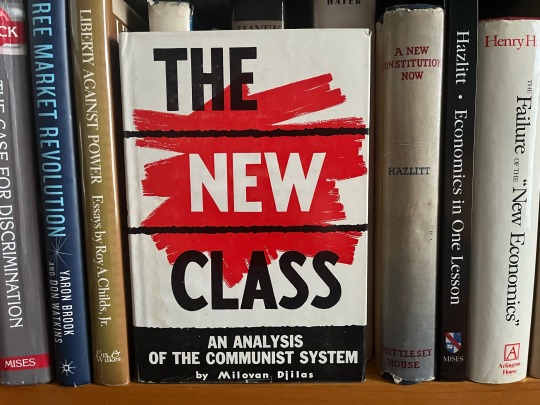
#djilas#milovan djilas#Đilas#new class#communism#ussr#soviet union#socialism#yugoslavia#stalin#lenin#trotsky#tito
8 notes
·
View notes
Text
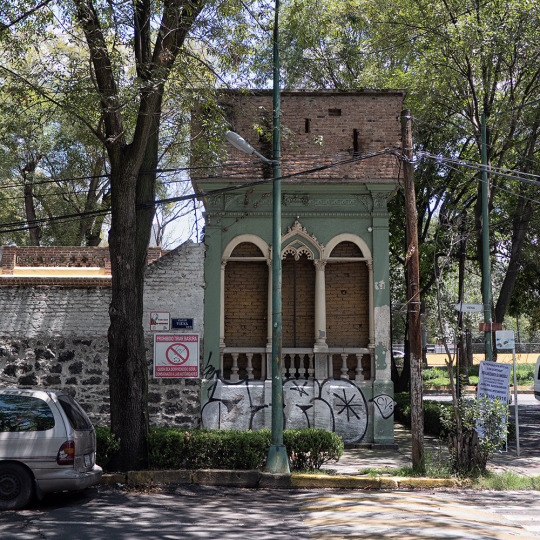
Trotsky’s house, Mexico City
14 notes
·
View notes
Quote
The British monarchy, hypocritical British conservatism, religiosity, servility, sanctimoniousness—all this is old rags, rubbish, the refuse of centuries, which we have no need for whatsoever.
Leon Trotsky Through What Stage Are We Passing?
55 notes
·
View notes
Text

Get organized
#my art#trotsky#marxism#revolution art#revolution#communism#international#red#red flag#traditional art#riot
9 notes
·
View notes